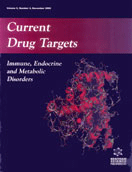Abstract
Nef is a viral pathogenicity factor that has an important role in disease progression associated with HIV infection. Yet, no antiviral drugs capable of inhibiting of Nef are available or in clinical trials today. In this review the challenges and potential involved in pharmaceutical targeting of Nef are discussed in light of current understanding of the molecular mechanisms of Nef action, with a special emphasis on effector functions of Nef that are mediated via SH3 domain-directed interactions with host cell proteins.
Keywords: nef, hiv, aids, protein interactions, signal transduction, drug screening
Current Drug Targets - Immune, Endocrine & Metabolic Disorders
Title: Therapeutic Targeting of Interactions Between Nef and Host Cell Proteins
Volume: 4 Issue: 4
Author(s): Kalle Saksela
Affiliation:
Keywords: nef, hiv, aids, protein interactions, signal transduction, drug screening
Abstract: Nef is a viral pathogenicity factor that has an important role in disease progression associated with HIV infection. Yet, no antiviral drugs capable of inhibiting of Nef are available or in clinical trials today. In this review the challenges and potential involved in pharmaceutical targeting of Nef are discussed in light of current understanding of the molecular mechanisms of Nef action, with a special emphasis on effector functions of Nef that are mediated via SH3 domain-directed interactions with host cell proteins.
Export Options
About this article
Cite this article as:
Saksela Kalle, Therapeutic Targeting of Interactions Between Nef and Host Cell Proteins, Current Drug Targets - Immune, Endocrine & Metabolic Disorders 2004; 4 (4) . https://dx.doi.org/10.2174/1568005310404040315
| DOI https://dx.doi.org/10.2174/1568005310404040315 |
Print ISSN 1568-0088 |
| Publisher Name Bentham Science Publisher |
Online ISSN 1875-5917 |
Related Articles
-
Targeting Tumor-Associated Antigens to the MHC Class I Presentation Pathway
Endocrine, Metabolic & Immune Disorders - Drug Targets Intestinal Targeting of Drugs: Rational Design Approaches and Challenges
Current Topics in Medicinal Chemistry Functional Foods: Salient Features and Clinical Applications
Current Drug Targets - Immune, Endocrine & Metabolic Disorders Allosteric Modulators of the Human Calcium-Sensing Receptor:Structures, Sites of Action, and Therapeutic Potentials
Endocrine, Metabolic & Immune Disorders - Drug Targets Applications of Metabonomics in Pesticide Toxicology
Current Drug Metabolism Recent Advances in the Development of Antimicrobial Peptides (AMPs): Attempts for Sustainable Medicine?
Current Medicinal Chemistry Concepts of Egr-1 Activation – A Hub for Signal Transduction Cascades
Current Signal Transduction Therapy Neurochemical and Neuropharmacological Aspects of Circadian Disruptions: An Introduction to Asynchronization
Current Neuropharmacology Patent Selections
Recent Patents on Cardiovascular Drug Discovery Potential of Selective Estrogen Receptor Modulators as Treatments and Preventives of Breast Cancer
Anti-Cancer Agents in Medicinal Chemistry Cardioregulatory Functions of Neuropeptides and Peptide Hormones in Insects
Protein & Peptide Letters Biological Mechanisms Linking Alzheimer's Disease and Type-2 Diabetes Mellitus
CNS & Neurological Disorders - Drug Targets Recent Advances in Obesity Pharmacotherapy
Current Clinical Pharmacology Expression Microarray Proteomics and the Search for Cancer Biomarkers
Current Genomics Vitamin D and Metabolic Syndrome: Is There a Link?
Current Pharmaceutical Design A Challenge for Medicinal Chemistry by the 17β-hydroxysteroid Dehydrogenase Superfamily: An Integrated Biological Function and Inhibition Study
Current Topics in Medicinal Chemistry Estrogen Regulation of Adipose Tissue Functions: Involvement of Estrogen Receptor Isoforms
Infectious Disorders - Drug Targets More Effective DPP4 Inhibitors as Antidiabetics Based on Sitagliptin Applied QSAR and Clinical Methods
Current Computer-Aided Drug Design The Role of Renal Nerve Ablation for the Management of Resistant Hypertension and other Disease Conditions: Benefits and Concerns
Current Vascular Pharmacology Involvement of MicroRNA Mir15a in Control of Human Ovarian Granulosa Cell Proliferation, Apoptosis, Steroidogenesis, and Response to FSH
MicroRNA



















